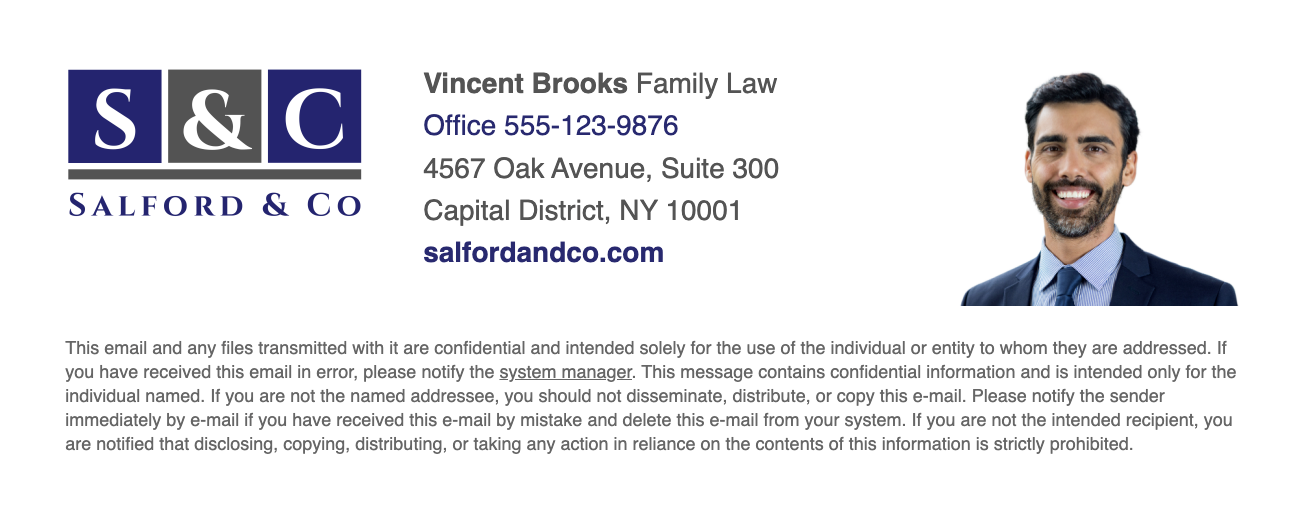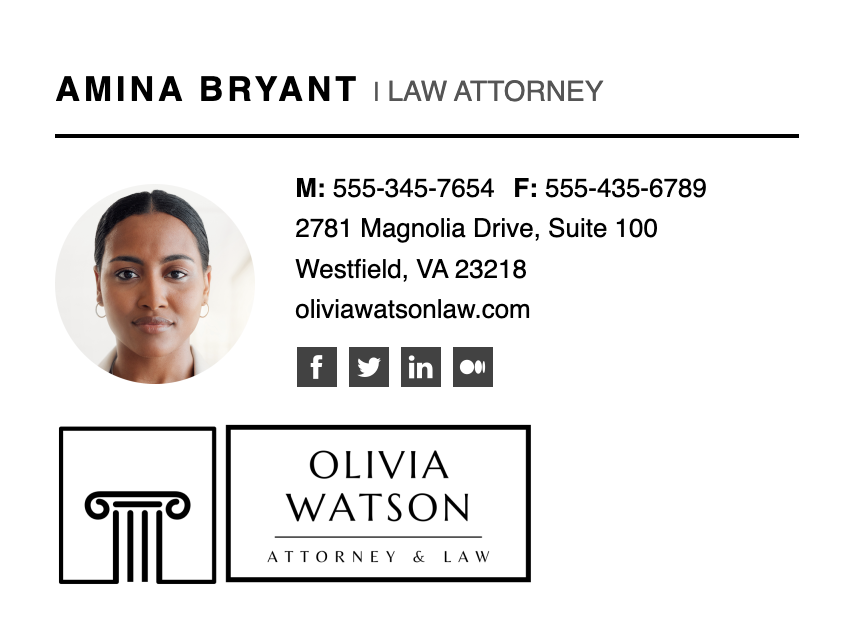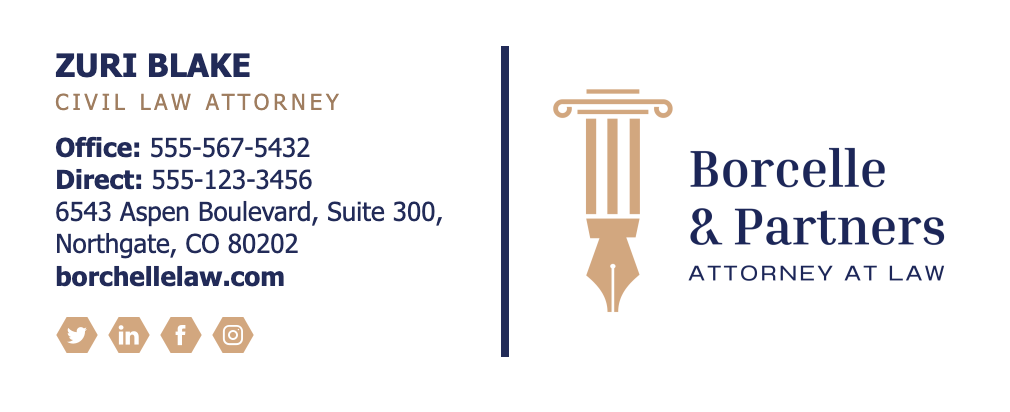Your email signature is like a digital business card - it’s how you present yourself and your law firm every time you send an email. For lawyers, it’s not just about looking professional; it’s important to include the right details, maintain legal compliance, and build trust.
Here’s what every lawyer’s email signature should include:
- Full Name & Credentials: Use titles like JD, LLM, or Esq. to establish authority.
- Job Title & Firm Name: Reinforce your professional role and branding.
- Contact Info: Add phone numbers, email, office address, and bar admissions.
- Legal Disclaimer: Protect sensitive communications with a confidentiality notice.
Optional elements like headshots, practice areas, certifications, or social media links can make your signature more engaging. Below are 5 templates tailored for different legal professionals:
- Classic Professional: A traditional, no-frills design for lawyers who value simplicity.
- Modern Minimalist: Clean and sleek, ideal for tech-savvy or contemporary practices.
- Corporate Partner: Focused on firm branding and hierarchy for large firms.
- Litigation Specialist: Highlights credentials, practice areas, and awards.
- Solo Practitioner: Personal and approachable, perfect for independent lawyers.
Choose a style that fits your practice, and ensures it looks great across devices with responsive formatting. Our free email signature generator can help you create a polished, consistent design.
Quick Comparison
| Template | Best For | Key Features |
|---|---|---|
|
Classic Professional |
Traditional law firms |
Simple layout, focus on professionalism |
|
Modern Minimalist |
Contemporary practices |
Sleek design with modern symbols |
|
Corporate Partner |
Large corporate firms |
Includes firm logo and structured hierarchy |
|
Litigation Specialist |
Litigation attorneys |
Highlights awards, credentials, and expertise |
|
Solo Practitioner |
Independent lawyers |
Personal touch with headshot and calendar link |
A professional email signature ensures every email you send reflects your expertise and credibility.
What to Include in a Lawyer's Email Signature
Crafting a professional email signature involves balancing professionalism with legal compliance. A well-designed signature not only reinforces your credibility but also ensures your communications are protected with the right disclaimers.
Key Elements to Include
Start with your full name and credentials to establish your professional identity. Include titles like JD, LLM, or Esq. to highlight your qualifications. For example:
Jane A. Smith, JD, LLM
Partner, Corporate Law
Next, include the law firm name and branding. Use fonts and colors that match your firm's style to maintain a polished, consistent look. This helps your emails stand out and reinforces your firm's identity.
Contact Information is essential and should include:
- Office and optional mobile phone numbers
- Office address
- Professional email address
- State bar numbers and the jurisdictions where you're licensed
Optional Additions to Consider
To make your email signature more engaging, you can include additional elements like:
| Element | Purpose | Best Practice |
|---|---|---|
|
Professional Photo & Social Media |
Builds connection and networking |
Use a high-quality headshot and link to platforms like LinkedIn |
|
Practice Areas |
Highlights your expertise |
List 2-3 main areas of focus |
Legal Disclaimers for Protection
Adding a legal disclaimer is crucial to safeguard privileged communications. A standard confidentiality notice might look like this:
"This email contains confidential, privileged information and is intended solely for the named recipient. Any unauthorized disclosure, copying, or use of this information is strictly prohibited."
This ensures your communications are protected and underscores the importance of confidentiality.
1. Classic Professional
The Classic Professional layout is a timeless, no-nonsense design that emphasizes clarity and trust. It’s ideal for attorneys who want to present a formal and authoritative image without unnecessary embellishments. The attorney’s name is set in bold, followed by their area of practice and neatly stacked contact details. Brand colors are used subtly in the phone number and links, offering a polished but understated touch. A firm logo is prominently placed to the left, giving visual weight and reinforcing credibility.
Here’s an example of how to set up this style:

This layout also includes a professional headshot on the right, striking the right balance between traditional and approachable. A confidentiality disclaimer is included at the bottom, a common feature for legal professionals, ensuring the message aligns with industry norms. It’s a dependable format for established firms and attorneys who value consistency, clarity, and professionalism in every interaction.
While this design leans on tradition, the next option brings a more modern and streamlined feel.
2. Modern Minimalist
This sleek, photo-based signature offers a modern and approachable look without sacrificing professionalism. A circular headshot adds a personal touch, while the clean layout keeps contact details clear and easy to read. Social media icons are tastefully included, and a firm logo grounds the design with strong brand presence. Ideal for attorneys who want to appear both polished and personable, this style works especially well for solo practitioners or small firms focused on client relationships.
Here’s an example of how it might look:

This layout is especially effective for attorneys who want to appear both professional and accessible—ideal for solo practitioners, boutique firms, or legal professionals in client-focused practices. The inclusion of branding elements and optional scheduling links ensures a high level of professionalism without clutter.
3. Corporate Partner
The Corporate Partner layout is a bold and structured signature design that puts firm identity and professional hierarchy front and center. The attorney’s name stands out at the top in strong, uppercase text, followed by their specialty in a muted accent color that aligns with the brand palette. The contact section uses a clear hierarchy—labeling “Office” and “Direct” lines separately—alongside a clean, stacked address and a standout firm website link. Hexagon-shaped social icons add a distinctive visual touch while keeping the layout professional.
Here’s an example of a polished layout:

To the right, the firm’s logo is prominently featured with ample space and clear alignment, reinforcing corporate branding with authority. The vertical divider between content and logo provides balance and symmetry, lending an organized, high-end feel. This signature is ideal for attorneys working in larger firms or leadership roles where brand presence, clarity, and polished professionalism are key to making the right impression.
While this design works well for large firms, the next template shifts focus to lawyers specializing in litigation.
4. Litigation Specialist
Litigation attorneys need an email signature that projects authority while staying approachable. This Litigation Specialist layout strikes a professional and personable tone—ideal for attorneys who are frequently in communication with clients, courts, and opposing counsel. The circular headshot provides a warm first impression, while the layout balances personal branding with firm identity. The attorney’s name is clearly emphasized, followed by a straightforward job title and neatly arranged contact information. Email and website links are styled for clarity and accessibility, ensuring important touchpoints are easy to find.
Here’s an example that does just that:

A prominent law firm logo on the right reinforces authority and institutional credibility, while a “Schedule a Meeting” button introduces a helpful, client-friendly feature often appreciated in high-volume practices. The overall color scheme—anchored in navy and gold—adds gravitas while maintaining visual harmony. This design is especially effective for litigation attorneys who need to project both trustworthiness and approachability in every email exchange.
While this template works perfectly for litigation attorneys, the next example addresses the specific needs of solo practitioners.
5. Solo Practitioner
This Solo Practitioner layout puts personality and clarity at the forefront, ideal for independent attorneys looking to build trust and recognition. The circular headshot at the top provides an immediate personal connection, followed by a bold display of the attorney’s name and specialty. The vertical layout naturally guides the eye downward through essential details, making it easy for clients to find key contact information quickly and without distraction.

The centered logo reinforces personal branding and professionalism, while the layout’s generous use of white space keeps everything clean and organized. Contact details, email, and website are presented in a straightforward, mobile-friendly format. Social media icons are placed neatly at the bottom, allowing for easy networking without cluttering the design. It’s a refined and approachable signature that supports relationship-building—perfect for attorneys who are both the face and foundation of their practice.
Once you’ve finalized your template, the next step is setting it up in your email client.
How to Add These Signatures to Your Email
A professional email signature acts as a digital business card for lawyers, helping to establish credibility while meeting legal requirements.
Here’s a quick look at different methods for creating and adding your signature:
| Method | Advantages | Drawbacks |
|---|---|---|
|
Direct HTML |
Full control over design |
Requires coding skills |
|
Built-in Editor |
Simple to use, no coding needed |
Limited design flexibility |
|
Third-party Service |
Polished templates, consistent look |
Comes with a cost |
Most email platforms make it easy to set up a signature. For instance:
- Gmail: Go to Settings > General > Signature
- Outlook: Navigate to File > Options > Mail > Signatures
- Apple Mail: Open Mail > Preferences > Signatures
These built-in tools let you add text, images, and hyperlinks with basic formatting. However, if you’re aiming for a more polished look, our simple drag-and-drop editor can help. This tool is particularly useful for legal professionals, as it provides templates tailored for law firms, ensuring a consistent and professional appearance across the board.
When designing your signature, keep mobile users in mind:
- Explicitly set image dimensions to avoid distortion.
- Use responsive layouts for contact info to ensure it looks good on any screen.
- Maintain consistent spacing and alignment for a clean appearance.
- Choose font sizes that are easy to read on smaller devices.
Once your signature is set up and tested, you’ll be ready to communicate with the professionalism your legal practice requires.
A well-crafted email signature is a key element of professional communication for lawyers. The templates discussed here provide practical options to enhance your email presence.
Whether you prefer the Classic Professional style for a more formal look or the Modern Minimalist design for a sleek, contemporary feel, the focus should always be on maintaining a consistent and polished appearance.
FAQs
What kind of email signature does a lawyer need?
When crafting an email signature for a lawyer, certain elements are key to ensure professionalism and compliance with legal standards.
A lawyer's email signature typically includes their full name, relevant credentials (like JD, LLM, or Esq.), their firm name, position, contact details, and a confidentiality disclaimer. This disclaimer helps safeguard privileged information and aligns with legal obligations.
Key Elements to Include:
- Full name (first, middle if applicable, and last name)
- Professional credentials (e.g., JD, LLM, Esq.) – optional but often recommended
- Law firm name and job title
- Contact information (phone number, office address)
- A confidentiality disclaimer

